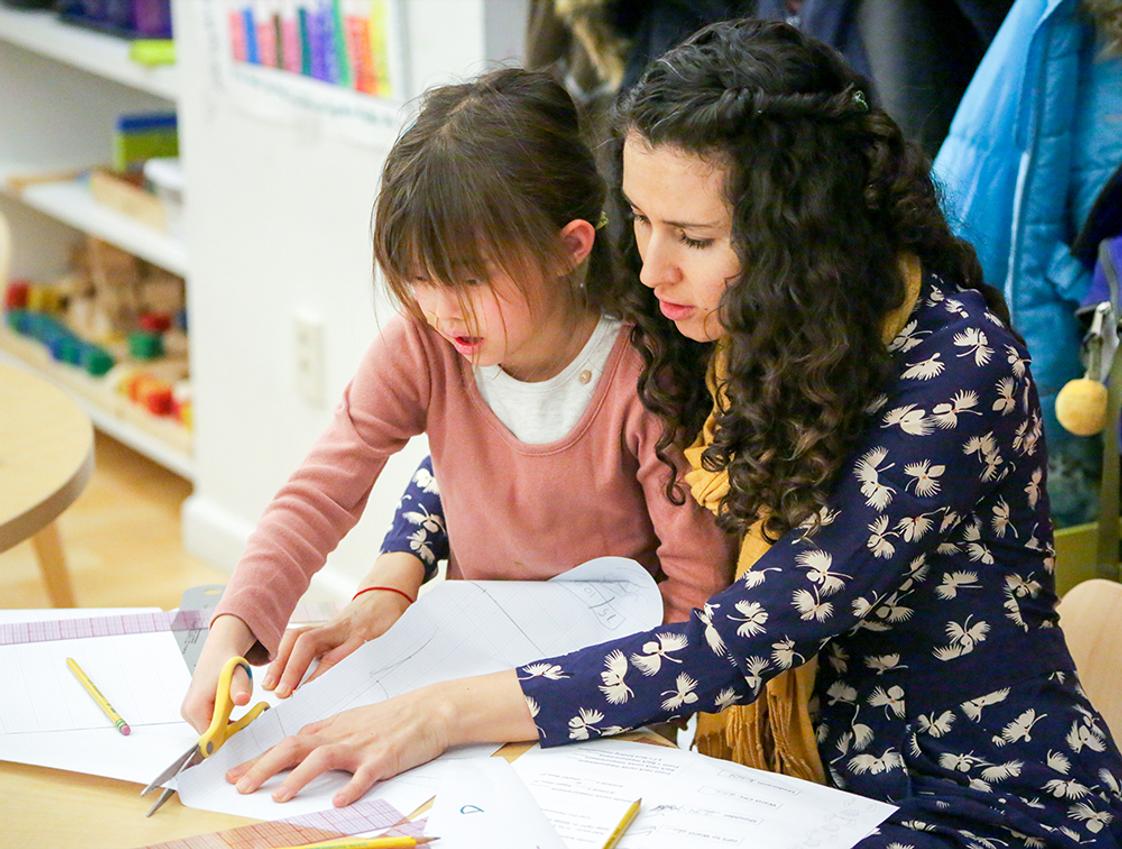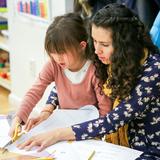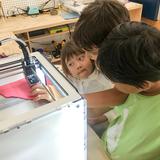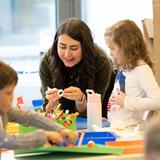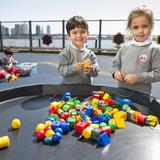Education Without Limits A K-8 school for creative problem solvers, innovators and lifelong learners. Portfolio School engages students from Kindergarten through 12th Grade as creative problem-solvers, innovators and lifelong learners.
Using methods developed at Stanford`s Design School, we follow an individualized approach which allows students to progress at their own pace and pursue their own interests.
Delving into interesting questions and design challenges, our students engage in science, technology, humanities, and the arts, not just as memorizers but as thinkers and creators.
Our students develop the abilities they need to thrive in and contribute to our rapidly changing technological, entrepreneurial, and global world.
School Overview
School Type
Religious Affiliation
Grades Offered
Grades Kindergarten-5
Year Founded
2016
Student Body
Total Students
41 students
Student Body Type
Co-ed
% Students of Color
14%
State avg.: 40%
Students by Grade
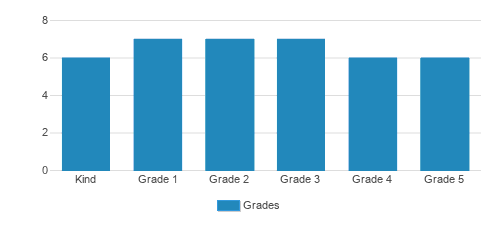
Academics and Faculty
Total Classroom Teachers
7 teachers
Student : Teacher Ratio
6:1
National avg.: 13:1
% Faculty w/Advanced Degree
80%
Average Class Size
14 students
Classroom Dress Code
Casual
Tuition and Acceptance Rate
Admission Deadline
Jan. 8 / rolling
Yearly Tuition Cost
$39,000
Tuition Notes
All inclusive tuition. Afterschool programs are additional cost.
Acceptance Rate
50%
National avg.: 85%
Admissions Director
Douglas Schachtel
School Notes
- Immersive Project-Based Learning
- Individualized attention
- Open learning environment
- Using individualized learning techniques and an immersive Project-Based Learning approach, we aim to instill in our students those abilities that make us human - the ability to be creative, to be resourceful, to be curious, to question, to persevere - so that they will have the best chance of future success, no matter what careers they may choose.
- Portfolio students will graduate with more than just grades and transcripts. They will possess the core knowledge they need to be successful, but also portfolios of skills, projects to illustrate that they are the kinds of thinkers, innovators and citizens most capable of leading us into the future.
- Our emphasis is on mastering skills, not overloading students with content. We measure growth across a range of skills, tracking where each student is at any given point in time. Each student will have their own digital dashboard, showing their individual progression. This dashboard can be accessed by the teaching staff, the parents and eventually by the students themselves. For relevant subjects (e.g., math, reading, writing), the mastery levels are aligned to the national and state standards. For other skills (e.g., critical thinking, communication, etc.) we use specialized assessment methods developed by our educator staff. We also have periodic assessments to ensure that each student has truly achieved and retained mastery levels, or whether they might need to refresh particular areas.
- While we harness the power of education technology to enable our approach, teachers are still our primary resource. The learning technologies we incorporate help teachers focus their time and attention on what matters most - each student - rather than grading tests and papers or teaching to the "middle" of the classroom. Our teachers have more time for one-on-one interactions with each student, tailoring their approach to fit each student's natural pace and interests. As a result Portfolio students become enthusiastic, hard-working and persistent learners who take ownership of their progression, improvement and success.
- Every day, a large part of each student's time at Portfolio will be spent immersed in fun and engaging interdisciplinary hands-on projects. By following the iterative principals of design thinking, students will develop problem-solving, collaborative and creative skills and learn to approach challenges with patience and an open mind. Research shows that project-based learning results in higher retention of knowledge than traditional rote memorization of facts. And as a bonus: it's a much more fun and engaging way to learn.
- Our elementary students learn through play, middle-schoolers begin to define their personal interests and discover their passions, and high school students apply their interests and passions to create meaningful work.
- Our balanced curriculum is shaped by STEAM principles (Science, Technology, Engineering, Arts/Humanities, and Math). Portfolio students will develop a deep understanding of core science and technology concepts. They will also be introduced to cutting edge technology and learn to use it in meaningful and purposeful ways. As a result they will be able to apply their learning to adapt to and help shape future innovation in any field of their personal or professional interest. Rounding out our curriculum are the humanities and the arts, an appreciation of which is a critical foundation to an educated life.
- A typical day at Portfolio is made up of extended blocks of time where students master core subjects and skills in an open, supportive learning environment through a combination of online learning, peer-to-peer engagement, and group discussions. Teachers move beyond the traditional broadcaster role and become guides who create "aha moments" for all students in the classroom. We are partnering with leading education technology companies for content delivery and lessons, and we will manage our own engineering team to fill any gaps that we see.
- Students are grouped together across age ranges (e.g., K-1, 2nd-3rd, etc.). In a multi-age setting, we foster a community where acceptance and empathy are not simply goals but expectations. We believe social and emotional intelligence is the foundation to an educated life, and research shows that multi-age settings strengthen deeper social and emotional skills and also prepare students for the real world, where they will interact with people of different ages.
Source: Verified school update
Frequently Asked Questions
How much does Portfolio School cost?
Portfolio School's tuition is approximately $39,000 for private students.
What is the acceptance rate of Portfolio School?
The acceptance rate of Portfolio School is 50%, which is lower than the national average of 78%.
When is the application deadline for Portfolio School?
The application deadline for Portfolio School is Jan. 8 / rolling (applications are due on Jan. 8 but additional applications are reviewed year-round as space permits ).
Recent Articles

A Parent's Guide To Understanding High School Teaching Methods
This comprehensive guide helps parents navigate the various teaching methods used in today's high school classrooms. By understanding these approaches, you'll be better equipped to support your teen's learning journey, communicate effectively with teachers, and create a complementary learning environment at home.

February 08, 2025
Social Emotional Learning: Education's Hidden SymphonyA musician's perspective on Social Emotional Learning reveals how this educational framework orchestrates success through five essential emotional competencies.

January 24, 2025
A Roadmap For Starting A Private SchoolUse this roadmap as a set of talking points with your trusted mentors and professionals to start the private school of your dreams. You're not alone. Over the years, hundreds of folks like you have had the same dream. From Quintilian to Maria Montessori to Lucy Madeira Wing, visionary educators have established schools to teach according to their beliefs and methodologies.


